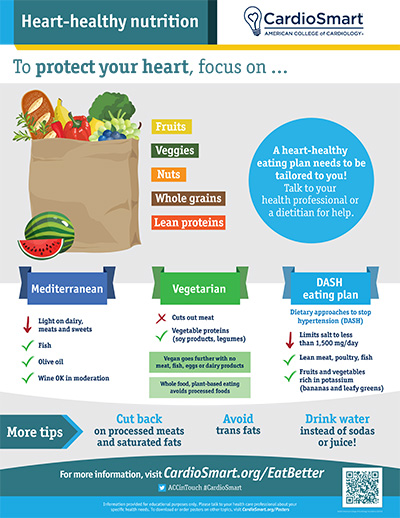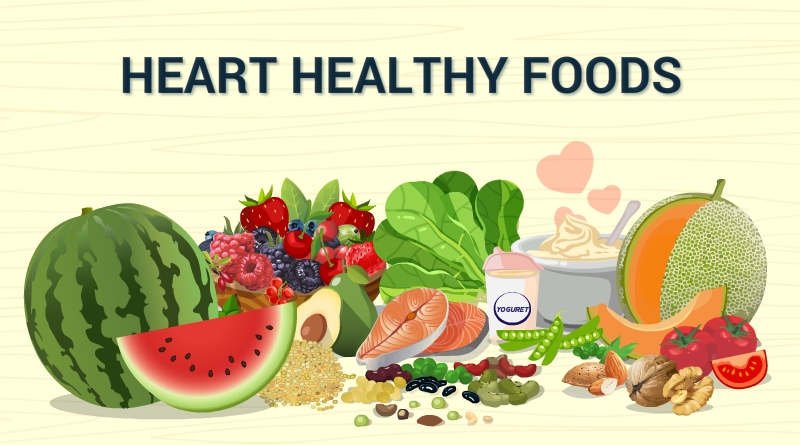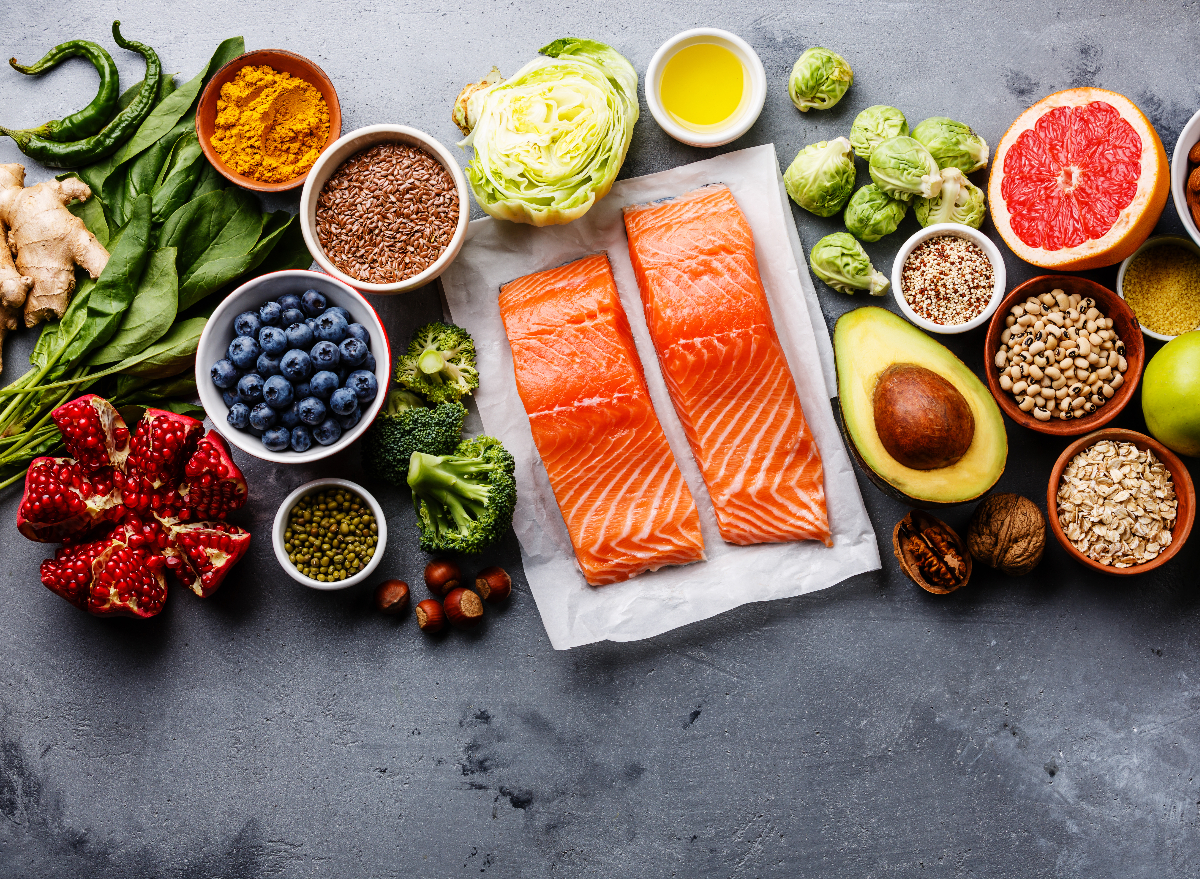Contents
Importance of Heart-Healthy Diet
Maintaining a heart-healthy diet is essential for overall well-being. A diet rich in nutritious foods can significantly reduce the risk of heart disease, lower blood pressure, and improve cholesterol levels. By making smart food choices, you can give your heart the nourishment it needs to function optimally.
A heart-healthy diet focuses on consuming nutrient-dense foods that are low in saturated fats, trans fats, and sodium. Instead, it emphasizes the intake of fruits, vegetables, whole grains, lean proteins, and healthy fats.
Implementing a heart-healthy diet not only promotes cardiovascular health but also helps maintain a healthy weight and reduces the risk of other chronic conditions such as diabetes. By incorporating these dietary changes into your daily routine, you can take proactive steps towards improving your heart health and overall quality of life.
Benefits of a heart-healthy diet

A heart-healthy diet offers numerous benefits for overall well-being. By incorporating nutrient-dense foods and avoiding those high in saturated fats, trans fats, and sodium, you can significantly reduce the risk of heart disease. This type of diet helps lower blood pressure, improve cholesterol levels, and promote optimal cardiovascular health. Additionally, a heart-healthy diet can aid in weight management and reduce the risk of other chronic conditions such as diabetes. With the right food choices, you can nourish your body with essential nutrients while taking proactive steps towards improving your heart health and enhancing your overall quality of life.
Impact of food choices on heart health

The impact of food choices on heart health is significant. Consuming a diet high in saturated fats, trans fats, and sodium can increase the risk of heart disease. On the other hand, opting for nutrient-dense foods can lower blood pressure, improve cholesterol levels, and promote optimal cardiovascular health. Making smart food choices is crucial in maintaining a healthy heart. By incorporating heart-healthy foods into your daily diet, such as dark leafy greens, fatty fish, berries, nuts, and seeds, you can nourish your body with essential nutrients while reducing the risk of chronic conditions like diabetes. Your food choices have the power to positively impact your heart health and overall well-being.
Dark Leafy Greens

Dark leafy greens, such as spinach, kale, and Swiss chard, are nutritional powerhouses that offer a wide array of health benefits. These greens are packed with vitamins A, C, and K, as well as folate and fiber. Incorporating dark leafy greens into your daily meals can have a positive impact on heart health. They contain antioxidants that help reduce inflammation in the body and promote healthy blood pressure levels. Dark leafy greens also provide important minerals like potassium and magnesium, which play a role in maintaining a healthy heart rhythm. Whether added to salads, soups, or smoothies, these versatile greens are an easy way to boost your heart-healthy diet.
Nutritional benefits of dark leafy greens

Dark leafy greens, such as spinach, kale, and Swiss chard, offer a wealth of nutritional benefits for heart health. Packed with vitamins A, C, and K, these greens also provide folate and fiber. The antioxidants found in dark leafy greens can help reduce inflammation in the body and contribute to healthy blood pressure levels. Additionally, they are rich in minerals like potassium and magnesium, which play a vital role in maintaining a healthy heart rhythm. Adding dark leafy greens to your meals is an easy way to boost your heart-healthy diet while enjoying their versatility in salads, soups, or smoothies.
Incorporating dark leafy greens into daily meals

Incorporating dark leafy greens into your daily meals is a simple and delicious way to enhance your heart-healthy diet. Here are some easy ideas to get you started:
- Add spinach or kale to your morning smoothie for an extra dose of vitamins and fiber.
- Toss a handful of mixed greens into salads, along with other colorful vegetables, for a nutrient-packed meal.
- Sauté Swiss chard with garlic and olive oil as a flavorful side dish.
- Use collard greens as wraps instead of tortillas or bread for a low-carb option.
- Blend cooked spinach into pasta sauces or soups for added nutrients.
By incorporating dark leafy greens into your meals, you can enjoy their numerous health benefits while adding variety and flavor to your diet.
Fatty Fish

Fatty fish, such as salmon, mackerel, and sardines, are excellent additions to a heart-healthy diet. These fish are rich in omega-3 fatty acids, which have been shown to promote heart health by reducing inflammation and improving blood vessel function. Omega-3s also help lower triglyceride levels and prevent the formation of blood clots. When it comes to choosing fatty fish for your diet, opt for wild-caught varieties rather than farm-raised ones. Wild-caught fish tend to have higher levels of omega-3s and fewer contaminants. Aim to include at least two servings of fatty fish in your weekly meal plan for optimal heart health benefits.
Omega-3 fatty acids in fatty fish

Fatty fish, such as salmon, mackerel, and sardines, are rich sources of omega-3 fatty acids. These essential fats play a crucial role in promoting heart health. Omega-3s have been shown to reduce inflammation in the body, which is a key factor in the development of heart disease. They also improve blood vessel function and can help lower blood pressure. Additionally, omega-3s can decrease triglyceride levels and prevent the formation of harmful blood clots. Including fatty fish in your diet regularly can provide you with these beneficial fats that support cardiovascular health. So, be sure to add some delicious salmon or mackerel to your weekly meal plan for a healthy heart boost!
Best types of fatty fish for heart health

When it comes to choosing fatty fish for heart health, some varieties stand out. Salmon, mackerel, and sardines are among the best options due to their high levels of omega-3 fatty acids. These essential fats have been shown to reduce inflammation in the body and improve blood vessel function, both of which are crucial for maintaining a healthy heart. Additionally, these fish are low in saturated fat and cholesterol, making them an excellent choice for those looking to support cardiovascular health. Including salmon, mackerel, or sardines in your diet at least twice a week can provide you with the necessary omega-3s for optimal heart health.
Berries

Berries are not only delicious but also packed with heart-healthy benefits. These vibrant fruits, such as blueberries, strawberries, and raspberries, are rich in antioxidants that can help protect your heart from damage caused by free radicals. Antioxidants also support overall cardiovascular health by reducing inflammation and improving blood flow. Incorporating berries into your daily diet is easy and enjoyable. You can add them to your morning oatmeal or yogurt, blend them into smoothies, or simply enjoy a handful as a snack. Aim for at least one serving of berries every day to reap their heart-protective benefits and satisfy your sweet tooth naturally.
Antioxidants in berries

Berries are bursting with antioxidants, which play a crucial role in promoting heart health. These antioxidants help protect the heart by neutralizing harmful free radicals that can cause damage to cells and contribute to cardiovascular diseases. Berries are particularly rich in flavonoids, a type of antioxidant that has been shown to reduce inflammation, improve blood flow, and lower the risk of heart disease. In fact, studies have found that regular consumption of berries is associated with a reduced risk of heart attacks and strokes. So whether you’re enjoying them fresh or frozen, be sure to include a variety of berries in your diet for their powerful antioxidant benefits.
Ways to enjoy berries in your daily diet

There are numerous delicious ways to incorporate berries into your daily diet. Here are some ideas to get you started:
- Add them to your breakfast: Sprinkle a handful of berries onto your cereal, oatmeal, or yogurt for a burst of flavor and antioxidants.
- Blend them into smoothies: Create a refreshing and nutritious smoothie by blending berries with your choice of milk or yogurt, along with other fruits and vegetables.
- Make a fruit salad: Combine different types of berries with other fruits like melons, grapes, or citrus for a colorful and tasty salad.
- Bake them into treats: Use fresh or frozen berries in muffins, pancakes, or desserts like pies and cobblers for a sweet twist.
- Snack on them alone: Enjoy a handful of fresh berries as a healthy and satisfying snack throughout the day.
Remember to mix up the types of berries you eat to maximize the range of antioxidants you consume!
Nuts and Seeds
:max_bytes(150000):strip_icc()/healthy-heart-foods-1-31d098d63bda4c8580a3438fa3dbf413.jpg)
Nuts and seeds are excellent additions to a heart-healthy diet. Packed with heart-healthy fats, fiber, and essential nutrients, they offer numerous benefits for cardiovascular health. Walnuts, almonds, flaxseeds, chia seeds, and sunflower seeds are some examples of heart-healthy nuts and seeds.
Incorporating nuts and seeds into your daily diet is easy. You can sprinkle them on top of cereals or salads, add them to smoothies or yogurt, or simply enjoy them as a snack on their own. They also make great toppings for baked goods like muffins or granola bars.
Remember to choose unsalted varieties to keep sodium intake in check. Aim for a handful of nuts or two tablespoons of seeds per day to reap the heart-protective benefits they provide.
Heart-healthy fats in nuts and seeds

Nuts and seeds are rich in heart-healthy fats that can help improve cardiovascular health. These fats, such as monounsaturated and polyunsaturated fats, have been shown to lower bad cholesterol levels and reduce the risk of heart disease. Walnuts, almonds, flaxseeds, chia seeds, and sunflower seeds are excellent sources of these beneficial fats. Incorporating a variety of nuts and seeds into your diet can provide essential nutrients like omega-3 fatty acids, fiber, vitamins, and minerals. These nutrients work together to support heart health by reducing inflammation and promoting healthy blood vessels. To enjoy the heart-protective benefits of nuts and seeds, add them to salads, yogurt parfaits or enjoy them as a snack on their own.
Creative ways to add nuts and seeds to your diet

There are plenty of creative and delicious ways to incorporate nuts and seeds into your daily diet. Here are a few ideas:
- Sprinkle them on top: Add a handful of chopped nuts or seeds to your morning cereal, yogurt, or smoothie bowl for an extra crunch and nutritional boost.
- Make homemade granola bars: Mix together oats, honey, nut butter, and a variety of nuts and seeds to create your own healthy and portable snack.
- Blend them into spreads: Create your own nut butter by blending roasted nuts with a touch of salt in a food processor. Spread it on whole grain toast or use it as a dip for fruits and vegetables.
- Use them as toppings: Sprinkle crushed nuts or seeds on salads, stir-fries, or roasted vegetables for added texture and flavor.
- Bake with them: Incorporate chopped nuts or ground flaxseeds into muffins, breads, cookies, or energy balls for an extra dose of heart-healthy fats.
By getting creative with how you use nuts and seeds in your meals and snacks, you can enjoy their heart-healthy benefits while adding variety to your diet.
Conclusion

Incorporating heart-healthy foods into your daily diet is a crucial step towards maintaining a healthy heart. Dark leafy greens provide essential nutrients, while fatty fish offers omega-3 fatty acids that promote heart health. Berries are packed with antioxidants that protect against oxidative stress. Nuts and seeds contain heart-healthy fats and can easily be added to meals or snacks for an extra nutritional boost. By creating a meal plan that includes these foods, you can support your cardiovascular well-being.
To maintain a balanced and nutritious diet, remember to prioritize whole foods and limit processed options. Stay hydrated, practice portion control, and aim for regular physical activity. With these tips in mind, you’ll be well on your way to boosting your heart health and enjoying a vibrant life.
Creating a heart-healthy meal plan
Creating a heart-healthy meal plan is essential for maintaining optimal cardiovascular health. Focus on incorporating a variety of nutrient-rich foods into your diet while limiting processed and unhealthy options. Start by including dark leafy greens, fatty fish, berries, nuts, and seeds as the foundation of your meals. These foods are packed with essential nutrients like vitamins, minerals, fiber, and heart-healthy fats.
To create a well-rounded meal plan, aim to include a balance of carbohydrates from whole grains, lean protein sources such as poultry or legumes, and healthy fats from sources like olive oil or avocado. Incorporate colorful fruits and vegetables as side dishes or snacks to boost antioxidant intake. Planning your meals ahead of time can help ensure that you have nutritious options readily available and minimize the temptation to make unhealthy choices.
Remember to practice portion control and listen to your body’s hunger cues. Stay hydrated by drinking plenty of water throughout the day. Regular physical activity is also an important component of maintaining heart health. By following these guidelines for a heart-healthy meal plan, you can support your cardiovascular well-being and enjoy long-term health benefits.
Tips for maintaining a balanced and nutritious dietol

- Meal planning: Plan your meals ahead of time to ensure you have nutritious options readily available. This can help you avoid making unhealthy choices when hunger strikes.
- Portion control: Pay attention to your portion sizes and listen to your body’s hunger cues. Avoid overeating and try to eat until you are comfortably satisfied, not overly full.
- Hydration: Stay hydrated by drinking plenty of water throughout the day. Water is essential for proper digestion and overall health.
- Limit processed foods: Minimize your intake of processed foods high in sodium, saturated fats, and added sugars. These can contribute to heart disease risk factors such as high blood pressure and cholesterol levels.
- Physical activity: Incorporate regular physical activity into your routine to support heart health and maintain a healthy weight.
Remember, small changes can lead to big improvements in heart health over time.
